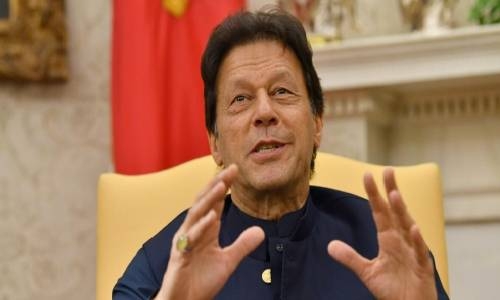No-trust vote on Sunday to decide Pakistan’s destiny: PM
Agencies | Islamabad
The Daily Tribune – www.newsofbahrain.com
Pakistan’s Prime Minister Imran Khan on Thursday accused the United States of meddling in Pakistan’s politics as a debate on a no-confidence motion against him in parliament was postponed.
No Pakistan premier has ever seen out a full term, and Khan is facing the biggest challenge to his rule since being elected in 2018, with opponents accusing him of economic mismanagement and foreign-policy bungling.
“Vote on the no-confidence motion will be held this Sunday [April 3]… On coming Sunday it will be decided in which direction this country will go,” he said while addressing the nation on Thursday. “I will not resign and fight till the last ball,” he added.
Fighting for his political life, Khan appeared to blunder when he named the United States as the origin of a “message” he said showed meddling in Pakistan’s affairs. “America has — oh, not America but a foreign country I can’t name. I mean from a foreign country, we received a message,” he said.
Local media have reported the message was in a briefing letter from Pakistan’s ambassador to Washington recording a senior US official telling him they felt relations would be better if Khan left office. “They say that ‘our anger will vanish if Imran Khan loses this no-confidence vote’,” he said.
“...the letter stated that the no-confidence motion was being tabled even before it was filed, which means the Opposition was in contact with them,” Khan said, adding that the letter was against him, not against the government. “It stated that if the no-confidence motion passes, Pakistan will be forgiven, if not, there will be consequences.” Khan said that it was an “official letter” that was communicated to Pakistan’s ambassador, who was taking notes during the meeting.
Khan first raised the issue on Sunday — citing an unnamed “foreign power” — at a huge rally of his supporters in the capital, Islamabad, capping weeks of political turmoil since the opposition raised the idea of a no-confidence vote. He has long complained that Pakistan was asked to sacrifice too much in joining Washington’s “war on terror”, launched in the aftermath of the 9/11 attacks, with too little recognition or reward.
“Has anyone said ‘thank you Pakistan’ for what we did?” he asked in Thursday’s address.
Khan insisted he would never resign. “I fight till the very last ball. I never quit whatever the result may be,” he said. “I will come back with more power, whatever the result is.”
Khan spoke off-the-cuff for around 45 minutes, touching on several topics including his efforts to get Islamophobia recognised as a global threat, and charting an independent path for Pakistan on the world stage.
Khan raised Western ire by visiting Moscow the day Russia invaded Ukraine, but he defended the trip, saying: “Even European leaders went to Russia, but Pakistan in particular is asked ‘why did you go’ as if we are their servants.”
Debate on the no-confidence motion was due to start on Thursday, but the deputy speaker — from Khan’s party — suspended proceedings when legislators declined to first address other items on the agenda. “The deputy speaker has once again dishonoured the parliamentary norms by not allowing the agenda item for a debate,” opposition leader Shahbaz Sharif, tipped to replace Khan if he goes, told reporters.
Parliament will sit again on Sunday morning. Khan’s Pakistan Tehreek-e-Insaf party (PTI) effectively lost its majority in the 342-member National Assembly Wednesday when a coalition partner said its seven lawmakers would vote with the opposition.— agencies
More than a dozen PTI lawmakers have also indicated they will cross the floor, although party leaders are trying to get the courts to prevent them from voting.
Khan was elected after promising to sweep away decades of entrenched corruption and cronyism, but has struggled to maintain support with inflation skyrocketing, a feeble rupee and crippling debt.
Some analysts say Khan has also lost the crucial support of the military — claims both sides deny — and Pakistan’s army is key to political power.
Related Posts

